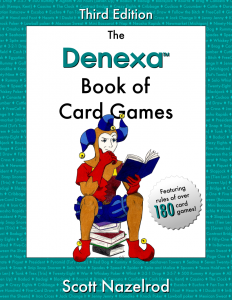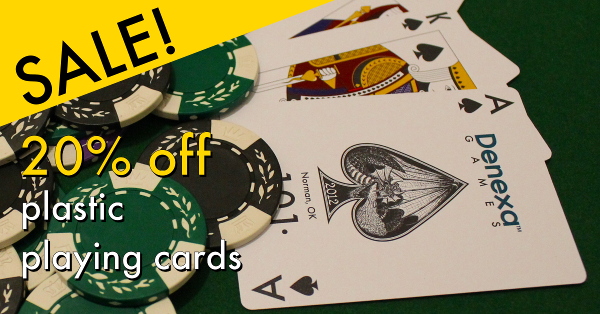Commune
Commune is a card game for two to ten players. In Commune, each player declares progressively higher poker hands, hoping all the while that the hand they declared can be formed by the combination of all of the cards dealt out on that hand. That means that to make a good Commune declaration, you need to take into account not only the cards in your hand, but based on your opponents’ declarations, what you think they may have as well!
Object of Commune
The object of Commune is to accurately predict whether a given poker hand can be formed from all of the cards that have been dealt.
Setup
To play a game of Commune, you’ll need a standard deck of playing cards with two jokers, a deck of 54 cards in all. A set of Denexa 100% Plastic Playing Cards is durable and easy to clean, and will give you exactly what you need to play the game. You’ll also need some form of token. Poker chips are perfect, but you can also use beans, toothpicks, pop can tabs, or anything else you have handy.
Give each player three tokens. Deal each player one card, face down. (On later hands, you’ll deal each player four cards minus the number of tokens they hold. Players will get more cards as they lose tokens.) The stub is set aside and takes no further part in game play.
Game play
All players look at their hand. Their hand, combined with the hands of all of the other players in the game, will be used to form a standard five-card poker hand. Jokers and 2s are wild, substituting for any other rank of card.
The player to the dealer’s left states any standard five-card poker hand that they believe the combined poker hand may include. Their declaration must include the rank of any relevant cards (e.g. ace high, pair of 6s, 5-high straight, etc.). Irrelevant cards (kickers) are not specified. The next player to the left must then name a higher poker hand, as must the next player to the left, and so on.
When a player believes that the last declaration made will not be found in the combined hand, they may say “Call.” All of the cards are turned face-up and combined. If the declared poker hand is present in the combined cards, the player that called loses one token. If it is not, the player that made the declaration loses a token. Note that the declared hand does not necessarily have to be the best poker hand that can be formed out of all the cards. It merely has to be possible to form it with the cards given.
The deal then passes to the left. The cards are gathered and shuffled, and a new hand is dealt. As the game continues, players will gradually run out of tokens. When a player runs out of tokens, they drop out of the game. The last player with remaining tokens wins the game.


